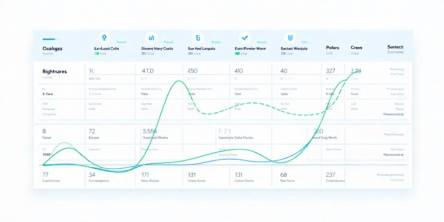SwiftUI vs UIKit: Which Framework is Ideal for Your App?

When one sets out to develop an iOS app for their business, they typically find themselves up against a rather challenging choice: should one use SwiftUI or UIKit for the said development project. The confusion is understandable but also easily addressed. The quickest and most effective way to pick between these two frameworks is to take a close look at the key points of differences between SwiftUI and UIKit. Apple developed both frameworks to allow developers to create powerful applications. And, the easiest way to imagine the differences between these two frameworks is that Apple made them easy to use depending on the type of programmer who is using them. And, interestingly a visually oriented programmer would prefer UIKit, while a programmatic oriented programmer would prefer SwiftUI.
Without further ado, here is a quick comparison between the two frameworks for developing iOS to help you decide which one you should use for your app development project.
1. Minimum iOS iteration: If you decide to opt for SwiftUI to develop your iOS app, it is imperative to remember that the app will work only on iOS 13. Now, even if you somehow figure out a way to support iOS 13, the question remains if it would be worth it. You see, SwiftUI can quickly prove to be rather limited — to the point that in iOS 13, it may not be possible to use SwiftUI for your app for more than a couple of pages. Sure enough, things are much better with iOS 14 and iOS 15, but you have to keep in mind the minimum viable iOS version for your app. Then there is UIKit which offers support for iOS versions as far as 9.0. The question here too is if you should.
2. Pace of development: Most people seem to agree that SwiftUI is the fastest tool when it comes to the pace of the development process and this assertion is not without reason. A close analysis of SwiftUI and UIKit shows that the former involves much less coding as compared to UIKit. However, the problem is that SwiftUI does not offer nearly as many features as UIKit does. Whatever feature one may find missing in SwiftUI, the developer will have to source the requisite feature or functionality from UIKit via help from the UIViewRepresentable protocol.
3. Widgets: If you are looking to add widgets to your iPhone app, then you have no option but to use SwiftUI. However, it may also be interesting to note that if you are keen on developing an iOS app using UIKit, it is possible to integrate a SwiftUI-based widget in a UIKit-based app. The only thing you need to remember is that SwiftUI is integral to each other. Experts believe this point of difference also presents an interesting opportunity: to experiment with the use of SWiftUI-based elements in an app that is built using UIKit.
Well, there you have it ladies and gentlemen: some of the key differences between SwiftUI and UIKit. While both of these tools are meant to enable the development of iOS apps, the truth remains that the two can prove to be quite distinctive in various aspects. So, if you too are trying to decide which one of the two best works for your development project, we recommend that you first take the time to carefully analyze your project, the associated requirements, the organization’s expectations from the project, and other such factors.
Then use the insights thus gained and compare them against what SwiftUI and UIKit have to offer. This process, though a tad extensive, will allow you to decide which of the two aforementioned programming tools is best suited for your endeavor in regards to the custom application development for the iPhone app for your business.
Similar Articles
Food delivery applications, including Uber Eats, DoorDash, Zomato, Swiggy, and Grubhub, generate large volumes of valuable data.
Modern businesses are drowning in communication overload, and much of that burden stems from outdated tools that simply can’t keep up
Building lending software isn’t just a technical project—it’s a business decision. Whether you're a fintech founder or part of a traditional lending institution trying to go digital, three questions will shape everything that follows
Learn why robust security is crucial for super app development. Explore key strategies and best practices for mobile app development security.
Walkie-talkies with an extensive reception capacity have changed significantly when it comes to portable communication by displaying cutting-edge features with seamless connectivity that covers more than just the state
USB-C technology has revolutionized the way we charge our devices, offering faster charging speeds, higher power delivery, and universal compatibility across multiple devices
Discover expert mobile app development strategies to create a viral app that attracts users and boosts engagement
Optimize app localization for iOS users across the EU with language, cultural, and regulatory adaptations. Engage users and boost retention with these tips!
Discover the top 10 mobile app development trends of 2024! Explore 5G, AI, AR/VR, blockchain, and more to stay ahead in the ever-evolving app development landscape.









